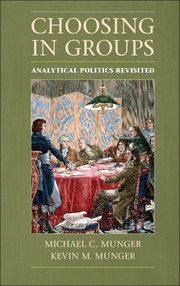Book contents
- Frontmatter
- Dedication
- Epigraph
- Contents
- List of Figures
- List of Tables
- Preface
- I Basics
- 1 The Analysis of Politics
- 2 Becoming a Group: The Constitution
- 3 Choosing in Groups: An Intuitive Presentation
- 4 The Analytics of Choosing in Groups
- II Spatial Theory
- III Extensions
- Answers to Selected Exercises
- Notes
- References
- Index
3 - Choosing in Groups: An Intuitive Presentation
Published online by Cambridge University Press: 05 February 2015
- Frontmatter
- Dedication
- Epigraph
- Contents
- List of Figures
- List of Tables
- Preface
- I Basics
- 1 The Analysis of Politics
- 2 Becoming a Group: The Constitution
- 3 Choosing in Groups: An Intuitive Presentation
- 4 The Analytics of Choosing in Groups
- II Spatial Theory
- III Extensions
- Answers to Selected Exercises
- Notes
- References
- Index
Summary
The general will rules in society as the private will governs each separate individual.
Maximilien Robespierre (attributed, 1791)From the point of view of seeking a consensus of the moral imperative of individuals, such consensus being assumed to exist, the problem of choosing an electoral or other choice mechanism, or, more broadly, of choosing a social structure, assumes an entirely different form from that discussed in the greater part of this study. The essential problem becomes that of choosing our mechanism so as best to bring the pragmatic imperative into coincidence with the moral. It is from this point of view that Rousseau discusses the relative merits of different forms of government.
In this aspect, the case for democracy rests on the argument that free discussion and expression of opinion are the most suitable techniques of arriving at the moral imperative implicitly common to all. Voting, from this point of view, is not a device whereby each individual expresses his personal interests, but rather where each individual gives his opinion of the general will.
Arrow (1963: 85)What Does “One” Want? What Do “We” Want?
Imagine that three people – Eugene, Justin, and Willow – want to have lunch, and they are a constituted group, so they want to have lunch together. The group finds itself in the wholesale produce district. There is not enough time to leave and return before one group member has an important appointment. There are no restaurants or retail grocers nearby, and all they can do is buy a bushel of one kind of food. If (but only if) they pool their money, they will be able to buy a bushel of one of the three types of food available: apples, broccoli, or carrots. If they cannot agree, they cannot buy anything; if they do agree, they can buy only that one thing.
How might our three hungry, rational people approach this problem? The first step for each is personal: What do I want? To decide this, each person consults an inner guide to choice (called “preference”). Before continuing with our example, we must take a moment and define what we mean by preference.
- Type
- Chapter
- Information
- Choosing in GroupsAnalytical Politics Revisited, pp. 42 - 57Publisher: Cambridge University PressPrint publication year: 2015



